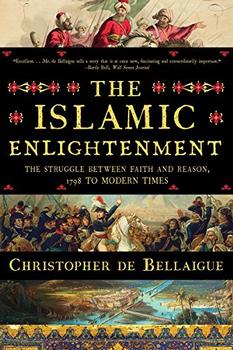Summary | Excerpt | Reviews | Beyond the Book | Readalikes | Genres & Themes | Author Bio

The Struggle Between Faith and Reason, 1798 to Modern Times
by Christopher de Bellaigue
In this paragraph from 1891, the Turkish woman of letters Fatma Aliye conveyed the immensity of the technological changes that had been agitating and inspiring the Ottoman Empire over the preceding decades. Her last sentence is deliciously unresolved: the meaning of life and the onus of interpreting it trickle from the certain past to a future that is soft and impressionable. It's all so different from Aliye's rigid and compartmentalised childhood in the 1860s, with the secluded and rarefied world inhabited by Aliye – daughter of a renowned Ottoman grandee – seemingly designed to maintain distinctions.
Aliye went into purdah aged fifteen, was married off four years later and learned French in secret in order not to outrage her mother, for whom the infidel tongue was a flag of apostasy. But no one – not even the frowning and despotic sultan, Abdulhamid II – could stop modernity, and the effect of the inventions that were seeping into the empire was to increase the sovereignty and autonomy of the individual. What Aliye wrote in seclusion the newly embraced institution of the press enabled her to diffuse among a rapidly expanding audience of literate Ottomans that was coming into existence thanks to the spread of education. Fatma Aliye's was a distinctive voice in the young universe of newspapers in Turkish; she wrote on girls' education and kicked against the stock male denigration of women. Her early literary output appeared under pseudonyms such as 'a woman', and when she eventually summoned the courage to publish novels under her own name, cynics of both sexes attributed them to her father or her brother.
The Brontë sisters had also published under pseudonyms – male-sounding ones in their case – because they had doubted whether anyone would want to read the work of unknown young women from Yorkshire. Strange to say, similar questions concerning the capacity of women would shortly be raised half a world away in Istanbul, where as early as 1869 a contributor to one of the new women's magazines, the weekly Terakki-i-Muhadderat ('Muslim Women's Progress'), declared irately, 'men were not made to serve women any more than women were made to be kept by men . . . are we not capable of gaining knowledge and dexterity? What is the difference between our legs, eyes and brains – and theirs? Are we not humans? Is it only our different sex that has condemned us to this condition? No one possessed of common sense accepts this.' As the Ottoman Empire modernised over the nineteenth century the world view of a growing number of assertive Turkish women grew substantially closer to that of their Western counterparts – to the point where the story of a young woman like Jane Eyre, taking decisions for herself, falling in love, making her living, making her way, wasn't so outlandish after all.
One of the things that make the life of Fatma Aliye so poignant is the productive relationship she had with the changing world around her. She was a true modern, formed by modernisation and forming it back again; and she advanced without fear into the new and dangerous fields of women's rights and public opinion.
Among her best-known works is a novel comprising letters by upper-class women speaking of their lives and their loves, a storyline that would have been nonsensical without an Ottoman postal service to draw on – this had been established in 1840. Aliye wrote about women who discussed philosophy with strange men aboard the steamships that plied the Bosporus dividing historic Istanbul from Asia; this service that had been introduced to great acclaim in 1854.
Fatma Aliye assumed the same philanthropic functions as many prominent women in the West, setting up a charity to help the families of soldiers who had fallen in the 1897 war between Turkey and Greece. Her works were translated into French and Arabic, and she was honoured with inclusion in the Women's Library of the World's Fair, in Chicago, in 1893. She spent her declining years pursuing her errant younger daughter Zubeyda, who had to her mother's chagrin converted to Catholicism and taken holy orders at Notre-Dame de Paris. In this lugubrious quest Aliye travelled around Europe – a Muslim woman alone (or with another of her daughters) in an infidel land. For a woman of her background to exercise this degree of autonomy would have been unthinkable in her youth. To travel to France and there hold intercourse with the natives would have been considered defiling of her morals, and she would have been shunned on her return. No longer.
Excerpted from The Islamic Enlightenment by Christopher de Bellaigue. Copyright © 2017 by Christopher de Bellaigue. With permission of the publisher, Liveright Publishing Corporation. All rights reserved.
A classic is a book that has never finished saying what it has to say
Click Here to find out who said this, as well as discovering other famous literary quotes!
Your guide toexceptional books
BookBrowse seeks out and recommends the best in contemporary fiction and nonfiction—books that not only engage and entertain but also deepen our understanding of ourselves and the world around us.